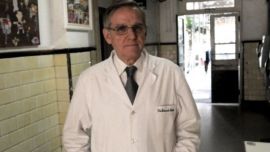While there are still 180 of football separating Boca Juniors and River Plate from a second Copa Libertadores Superclásico in as many years, the die now seems cast. Both Buenos Aires giants dispatched their quarter-final rivals with ease in this week’s first legs to inch closer to a blockbuster last-four clash which will once more paralyse an entire nation.
With the dust barely settled on last year’s bitter final, though, can Argentina handle another clash of such magnitude?
Boca struck first in the quest to reach the decisive stages of the competition, with a result that was almost shocking in its ease. Ecuador’s Liga de Quito are usually a tricky prospect for any continental challenger, particularly when the capital’s lung-busting altitude is factored in to equations. But the Xeneize barely sweated in beating the hosts 3-0, controlling the game from start to finish as Ramón Ábila and Emanuel Reynoso established the advantage before Luis Caicedo succumbed to incessant pressure and put past his own goalkeeper.
Above all, it was a match that demonstrated how much Boca have grown in the last eight months since club hero – but oftquestioned during his spell on the bench – Guillermo Barros Schelotto was replaced by the pragmatic journeyman Gustavo Alfaro as coach. Alfaro’s teams are rarely easy on the eye and the ex-Huracán man has attracted criticism for a number of rather uninspiring performances from his side, including from this column. But he has come into his own during the early stages of this Libertadores knock-out phase, planning to perfection consecutive away victories over Athletico Paranaense and the Ecuadoreans without conceding a single goal.
Nobody was more relieved to see Boca run out comfortable winners than Alfaro himself, who decided to break with accepted logic and send his team to Quito two days before the match; most clubs arrive with hours to spare before kick-off, a gambit that supposedly reduces the effects of altitude on those unfamiliar with such conditions. “If Boca lost, I would have been sacrificed in a public park,” he joked to reporters after the final whistle. “I’m not surprised [by the criticisms]. It’s been that way my whole life, it always happened. The only thing I know how to do is keep my mouth shut and work.”
If the resilience Boca have rediscovered under their new boss comes as somewhat of a surprise, the same cannot be said upon seeing their arch-rivals once more amongst South America’s best. River may have needed two penalties to see off Cerro Porteño on Thursday at the Monumental but in truth their Paraguayan opponents were lucky to remain in sight at the final whistle, having failed to muster a single shot on target over a grim 90 minutes of holding on for dear life. Goals are clearly not lacking for Marcelo Gallardo’s men, having notched six past reigning Superliga champions Racing Club as recently as last Saturday. What the Millonarios do need at certain points are cooler heads, greater precision in finishing off the procession of chances their dynamic, high-octane football all but guarantees. There is also no arguing with results: River are now the only side left in the Libertadores who have yet to taste defeat in this year’s edition, and unless disaster strikes in Asunción next Thursday – or, of course, at the Bombonera the day before – they will begin to look forward to the Superclásico knowing that as defending champions and Boca’s vanquishers last December the onus is on the Xeneize to dethrone them this time round.
If this week’s results pan out as
expected River will ‘welcome’
their rivals to the Monumental on
October 1st or 2nd, with the return leg in La Boca scheduled
three weeks later. The following
Sunday, Argentina goes to the
polls in order to elect its next president, a task that, if the results
and aftermath of August’s primaries is any indication, may
prove to be as gruelling and
fraught with risk as any Superclásico. If the country survives
such a nerve-wracking week, the
winner of this latest blockbuster
will fancy their chances of going
all the way and taking the Libertadores trophy itself. Right now,
though, that appears a
rather big if.related news





















Comments